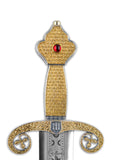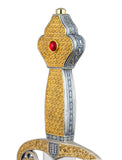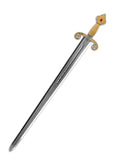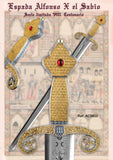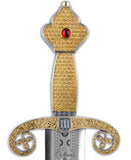COMMEMORATIVE SWORD FOR THE VIII CENTENARY OF THE BIRTH OF ALFONSO X OF CASTILE “THE WISE”

Spanish sword of the 13th century, with a long and wide blade, two edges and a cut point, with a very flat channel in the centre, and gradually tapering in the last third. Double-edged blade with prominent engravings.
The trimming is made up of a gilded silver-plated flowerbed, with arms arched towards the leaf, ending in pointed trefoils.
In the centre of the cross or guard you can see the arms of Castile on one side and the lion on the other.
The handle is silver plated over gold carved on the edges and on the planes. It is cylindrical, almond-shaped and with superimposed mesh in Gothic style.
The pommel is silver plated over gold in the shape of a fleur-de-lised ataurique, similar to those that bear prints and gracefully adorn its edges. It is irregular in shape, with mesh also chiselled in the same style as the handle.
This sword consists of a chiselled cross with curved hawks towards the blade finished in a clover leaf.
NUMBERED SERIES AND LIMITED TO 800 UNITS
In commemoration of the VIII Centenary of the Birth of ALFONSO X “El Sabio”
- Overall: 102 cm / 40 inches
- Blade: 83 cm / 32.7 inches
- Handle: 19 cm / 7.5 inches
- Blade Width: 55 mm / 2.2 inches
- Cross Width: 16 cm / 6.3 inches
- Weight: 2 kg / 4.4 lbs
- GOLD-PLATED SILVER FINISHING / FILIGREE HANDLE / IMITATION RUBY APPLIQUE ON POMMEL
- DEEP ACID ETCHING
- Limited Edition only 800 numbered swords produced
- Certificate of Origin and Quality, "Made in Toledo" (Spain)
High Quality Sword of the exclusive Collection "Heroes and Civilizations" made by Marto.
BIOGRAPHY
Alfonso X of Castile, byname Alfonso the Wise, or the Learned, Spanish Alfonso el Sabio, was born in Toledo in 1221. He was king of the Crown of Castile from 1252, the year in which his father, Fernando III of Castile, the Saint, died. He would remain so until his own death on April 4, 1284 in Seville.
He promoted an active economic policy, reformed the currency and the inland revenue and recognised the Honoured Council of La Mesta (the powerful association of sheep owners). He produced an outstanding body of literary, scientific, historical and legal work through his Royal Scriptorium. Alfonso X patronised, supervised and frequently contributed with his own writing, and in partnership with the cohort of intellectuals known as the School of Translators of Toledo, in the composition of an extensive literary collection which largely served as the starting point for prose works in Castilian. Of particular note are his 'Songs of Santa María' (lyrical songs in Galician-Portuguese accompanied by musical notation), the collection of exemplary tales known as 'Calila et Dimna' in Castilian, and the legal work 'Siete partidas'.






